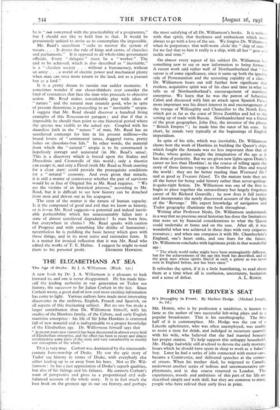THE ELIZABETHANS AT SEA The Age of Drake. By J.
A. Williamson. (Black. 15s.) A NEW book by Dr. J. A. Williamson is a pleasure to look forward to, and one is never disappointed. He has made him- self the leading authority in our generation on Tudor sea
history, the successor to Sir Julian Corbett in the last. Since Corbett wrote, a great deal of new and most exciting information has come to light. Various authors have made most interesting discoveries in the archives, English, French and Spanish, on all aspects of this fascinating subject. But no one has made a larger contribution than Dr. Williamson himself, with his studies of the Hawkins family, of the Cabots, and early English maritime enterprise : his life of Sir John Hawkins is crammed full of new material and is indispensable to a proper knowledge of the Elizabethan age. Dr. Williamson himself says that " in recent years new material has been discovered in almost every field of Elizabethan enterprise, and the effect has been to recast and almost revolutionise some parts of the story and very considerably to modify our conception of the whole."
That is very true. Corbett was dominated by the nineteenth- century hero-worship of Drake. He saw the epic story of Tudor sea history in terms of Drake, with everybody else either leading up to or away from his hero. Not so Dr. Wil- liamson : he has a just appreciation of Drake's superb qualities, but also of his failings and his failures. He corrects Corbett's want of perspective and gives us a proportioned and well- balanced account of the whole story. It is in fact much the best book on the-greatest age in our sea history, and perhaps
the most satisfying of all Dr., Williamson's books. It is writte•: with that spirit, that freshness and enthusiasm which seem always to go with a love of the sea. We forgive Dr. Williamsuri
when he perpetrates that well-worn cliché the " ship of state," for we feel that to him it really is a ship, with all her " gear and tackle and trim."
On almost every aspect of his subject Dr. Williamson h.., something new to say or new information to bring forward. A recent work said rather well of Northumberland that " his career is of some significance, since it sums up both the ignoble side of Protestantism and the unresting cupidity of a class."
Dr. Williamson bears out still further how significant that restless, acquisitive spirit was of his class and time in what he tells us of Northumberland's encouragement of maritime
enterprise. We learn that he was the patron of Sebastian Cabot and discussed with him an attack upon Spanish Peru ; more important was his direct interest in and encouragement of the voyage of Willoughby and Chancellor to the North East, which got as far as the coast of Nova Zemblya and led to the setting up of trade with Russia. Northumberland was a friend of the great geographer, John Dee, the inventor of the phrase " British Empire " ; he made him the tutor of his sons. In
short, he stands very typically at the beginnings of English imperialism.
In spite of his title, which was inevitable, Dr. Williamson shows how the work of Hawkins in building the Queen's ships which fought the Armada was no less important than that of Drake, whose genius caught the imagination of the age as it has done of posterity. But we are given new lights upon Drake's career no less than Hawkins', in the course of telling again the story of those famous voyages to Nombre de Dios and round
the world : they are far better reading than Westward Ho ! and as good as Treasure Island. To the mature taste they are all the better for being solid history rather than never-getting- it-quite-right fiction. Dr. Williamson was one of the first to begin to piece together the extraordinary but largely forgotten career of Sir Richard Grenville ; he now does it full justice and incorporates the newly discovered account of the last fight
of the ' Revenge.' His expert knowledge of navigation and Tudor geography illuminate the book throughout.
Writing after Professor Neale, Dr. Williamson understands in a way that no previous naval historian has done the limitations that were set by financial considerations to what the Queen could undertake at home and on the seas. After all, it was wonderful what was achieved in those days with very exiguous resources ; and when one compares it with Mr. Chamberlain's England, one's heart sinks, and one fears for the future.
Dr. Williamson concludes with legitimate pride in that wonderful age :
" The whole world today might have been unimaginably different, but for the achievements of the age this book has described, and of the great men whose spirits blazad in such a galaxy as was never seen in England before, nor has been since."
It refreshes the spirit, if, it is a little humiliating, to read about them at a time when dr is confusion, uncertainty, hesitation


































 Previous page
Previous page